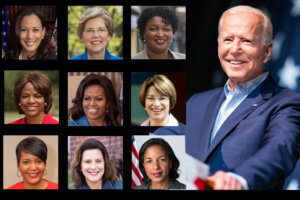West Long Branch, NJ – Arizona’s Electoral College votes could be in play in November, according to a Monmouth (“Mon-muth”) University Poll of registered voters in the state. Joe Biden has a slight lead over President Donald Trump, while Bernie Sanders is basically tied with the incumbent. In tomorrow’s Democratic primary election, Biden has a 20 point lead over Sanders. The poll also finds that the Arizona U.S. Senate race could start off with a Democratic edge as well, with Mark Kelly having a 6 point lead against Martha McSally. In other poll results, a majority of Arizona voters are concerned about coronavirus hitting their family, but the level of concern varies widely by party affiliation.
Among Arizona voters who are considered likely to participate in the Democratic primary for president, support currently stands at 51% for Biden and 31% for Sanders. Tulsi Gabbard is backed by just 1% and candidates who have dropped out of the race also get support from early voters, including Mike Bloomberg (5%), Elizabeth Warren (3%), Pete Buttigieg (3%), and Amy Klobuchar (1%).
Sanders actually leads Biden among Latino voters (48% to 41%) and voters under 50 years old (56% to 28%), but this is more than offset by Biden’s strong advantage among larger voter blocs, including white voters (55% to 26%) and those aged 50 and over (64% to 16%). Just over half of likely Arizona primary voters report having already cast their ballots. Biden has a 50% to 27% lead over Sanders among this group. Among those yet to vote, the race stands at 51% Biden and 36% Sanders.
“Biden has a strong advantage going into the primary. This is because much of his support has already been banked in the early vote. The closure of many polling places due to COVID-19 means it is uncertain how many voters who planned to vote on Tuesday will actually show up,” said Patrick Murray, director of the independent Monmouth University Polling Institute.
Looking at hypothetical general election matchups for November, Biden holds a small 46% to 43% edge over Trump, while the incumbent leads Sanders by 44% to 43%. Trump beat Hillary Clinton in Arizona by 4 points in 2016’s election. The difference between Biden and Sanders against Trump seems to be down to what 2016 Clinton voters will do in 2020. Trump holds on to 86% of his 2016 voters against Biden (who gets 8% of them) and 87% of his 2016 voters against Sanders (who gets 6% of them). Among 2016 Clinton voters, 90% will support Biden (to 4% for Trump), but only 80% will support Sanders (to 7% for Trump).
“Impressions of the Democratic nominee will shift once the general election campaign gets under way, but Biden would start off by putting Arizona within reach,” said Murray.
Turning to the hotly contested U.S. Senate race, Democrat Kelly holds a small 50% to 44% lead over incumbent Republican McSally in a hypothetical matchup in November’s special election. McSally leads among men (53% to 42%) while Kelly leads among women (57% to 36%). McSally is running to complete the final two years of the late Sen. John McCain’s term. She was appointed to the post after she lost the election for Arizona’s other senate seat in 2018.
The Monmouth University Poll also finds that a majority of Arizona voters are either very (21%) or somewhat (32%) concerned about someone in their family becoming seriously ill from the coronavirus. Another 28% are not too concerned and 19% are not at all concerned. Even though the new coronavirus virus is expected to impact older people more, voters aged 65 or over (50%) are less concerned about the impact than those under 35 years old (62%). Perhaps more interestingly, Republicans (41%) and independents (47%) are less concerned about a family member getting ill from COVID-19 than Democrats (75%).
“Early claims that the emerging pandemic was being politicized may be leading the public to see all aspects of this situation through a partisan lens. And that lens seems to extend to the possibility of contracting the virus itself,” said Murray.
About half the state’s voters (49%) say the federal government has done a good job handling the outbreak, while 43% say it has done a bad job. Similarly, 49% say Trump has done a good job handling the outbreak, while 46% say he has done a bad job. Arizona voters are split on the impact of the president’s televised Oval Office address on Wednesday. Just under one-fourth (23%) say it made them feel more confident in his administration’s ability to deal with the outbreak while slightly more (29%) say it made them feel less confident. Another 36% say his address did not change their level of confidence and 10% were not aware of it.
While Arizona voters are divided on the president’s handling of the COVID-19 situation, overall opinion of him is underwater. Currently, 41% have a favorable view of Trump and 50% hold an unfavorable opinion, with another 10% offering no opinion. Voters are split on their opinion of the Democratic front-runner. Biden has a 36% favorable and 38% unfavorable rating among state voters, but 1 in 4 (26%) have no opinion of him. Voter opinion of Sanders is decidedly negative at 31% favorable and 47% unfavorable, with 22% having no opinion.
For the U.S. Senate contenders, challenger Kelly has a decidedly positive rating of 41% favorable and just 17% unfavorable, although 42% of Arizona voters have no opinion of him. McSally, on the other hand, holds a divided 35% favorable and 39% unfavorable rating, with 26% having no opinion of her. The incumbent does slightly better on her job rating, with 42% of voters approving and 39% disapproving of the job she is doing as U.S. senator.
On other issues, the poll finds that most (56%) Arizona voters say their family’s current financial situation is stable, while 23% say it is improving and 18% say they are struggling. About 3 in 10 (29%) say the federal government’s actions over the past three years have helped their financial situation, 16% say those actions have hurt them, and 53% say the federal government has had no impact on their finances.
On the issue of health care, 39% of the public would prefer a system that allows people to opt into Medicare or keep their private coverage, while 19% would keep the system private but regulate the costs, and 25% would keep the health insurance system as it is now. Just 12% want to switch to a universal system that gets rid of all private insurance.
As to immigration policy, 45% of Arizona voters support building a wall along the U.S. border with Mexico and 50% oppose this. There is a huge partisan divide on this issue – 88% of Republicans support a border wall and 87% of Democrats oppose it. More independents oppose (56%) rather than support (37%) building a border wall.
The Monmouth University Poll was conducted by telephone from March 11 to 14, 2020 with 847 Arizona registered voters. The question results in this release based on all registered voters have a margin of error of +/- 3.4 percentage points. Results based on 373 voters who are likely to vote in the Democratic presidential primary on March 17, 2020 have a margin of error of +/- 5.1 percentage points. The poll was conducted by the Monmouth University Polling Institute in West Long Branch, NJ.
QUESTIONS AND RESULTS
(* Some columns may not add to 100% due to rounding.)
[Q1 WAS ASKED OF LIKELY DEMOCRATIC PRIMARY VOTERS.]
1. If the Democratic primary election for president was today, would you vote for Joe Biden, Bernie Sanders, or Tulsi Gabbard? [NAMES WERE ROTATED] [If UNDECIDED: If you had to vote for one of these candidates at this moment, who do you lean toward?] [Note: voters who already returned an early/absentee ballot were read a list of seven candidate names.]
| DEM PRIMARY VOTERS (with leaners) |
March 2020 |
| Joe Biden | 51% |
| Bernie Sanders | 31% |
| Tulsi Gabbard | 1% |
| Elizabeth Warren | 3% |
| Mike Bloomberg | 5% |
| Amy Klobuchar | 1% |
| Pete Buttigieg | 3% |
| (VOL) Other | <1% |
| (VOL) Undecided | 5% |
| (n) | (373) |
[Q2 WAS ASKED OF LIKELY DEMOCRATIC PRIMARY VOTERS.]
2. When thinking about who you are supporting in the Democratic primary, how much of a factor is beating Donald Trump in November – is it more important than any policy issue you are concerned with, about as important as your top policy concern, or less important than your top policy concern?
| DEM PRIMARY VOTERS |
March 2020 |
| More important | 63% |
| About as important | 26% |
| Less important | 9% |
| (VOL) Don’t know | 2% |
| (n) | (373) |
[THE FOLLOWING QUESTIONS WERE ASKED OF ALL REGISTERED VOTERS.]
Now, looking ahead to November’s general election…
[QUESTIONS 3A & 3B WERE ROTATED]
3A. Who would you vote for if the candidates for president were Donald Trump the Republican and Joe Biden the Democrat? [NAMES WERE ROTATED]
| ALL REGISTERED VOTERS |
March 2020 |
| Donald Trump | 43% |
| Joe Biden | 46% |
| (VOL) Other candidate | 3% |
| (VOL) Would not vote | 2% |
| (VOL) Undecided | 6% |
| (n) | (847) |
3B. Who would you vote for if the candidates for president were Donald Trump the Republican and Bernie Sanders the Democrat? [NAMES WERE ROTATED]
| ALL REGISTERED VOTERS |
March 2020 |
| Donald Trump | 44% |
| Bernie Sanders | 43% |
| (VOL) Other candidate | 4% |
| (VOL) Would not vote | 3% |
| (VOL) Undecided | 6% |
| (n) | (847) |
4. If the election for U.S. Senate was today, would you vote for Martha McSally the Republican or Mark Kelly the Democrat? [NAMES WERE ROTATED] [If UNDECIDED: If you had to vote for one of the following candidates at this moment, who do you lean toward – Martha McSally or Mark Kelly?]
| ALL REGISTERED VOTERS (with leaners) |
March 2020 |
| Martha McSally | 44% |
| Mark Kelly | 50% |
| (VOL) Other candidate | 1% |
| (VOL) Will not vote for Senate | 1% |
| (VOL) Undecided | 4% |
| (n) | (847) |
Regardless of who you may support for president…
[QUESTIONS 5/6/7 WERE ROTATED]
5. Is your general impression of Donald Trump favorable or unfavorable, or do you have no opinion of him?
| ALL REGISTERED VOTERS |
March 2020 |
| Favorable | 41% |
| Unfavorable | 50% |
| No opinion | 10% |
| (n) | (847) |
6. Is your general impression of Joe Biden favorable or unfavorable, or do you have no opinion of him?
| ALL REGISTERED VOTERS |
March 2020 |
| Favorable | 36% |
| Unfavorable | 38% |
| No opinion | 26% |
| (n) | (847) |
7. Is your general impression of Bernie Sanders favorable or unfavorable, or do you have no opinion of him?
| ALL REGISTERED VOTERS |
March 2020 |
| Favorable | 31% |
| Unfavorable | 47% |
| No opinion | 22% |
| (n) | (847) |
Turning to the Senate race…
[QUESTIONS 8 & 9 WERE ROTATED]
8. Is your general impression of Martha McSally favorable or unfavorable, or do you have no opinion of her?
| ALL REGISTERED VOTERS |
March 2020 |
| Favorable | 35% |
| Unfavorable | 39% |
| No opinion | 26% |
| (n) | (847) |
9. Is your general impression of Mark Kelly favorable or unfavorable, or do you have no opinion of him?
| ALL REGISTERED VOTERS |
March 2020 |
| Favorable | 41% |
| Unfavorable | 17% |
| No opinion | 42% |
| (n) | (847) |
10. Do you approve or disapprove of the job Martha McSally is doing as U.S. senator?
| ALL REGISTERED VOTERS |
March 2020 |
| Approve | 42% |
| Disapprove | 39% |
| (VOL) No opinion | 18% |
| (n) | (847) |
11. Thinking about your current financial situation, would you say you are struggling to remain where you are financially, basically stable in your current financial situation, or is your financial situation improving?
| ALL REGISTERED VOTERS |
March 2020 |
| Struggling | 18% |
| Stable | 56% |
| Improving | 23% |
| (VOL) Don’t know | 3% |
| (n) | (847) |
12. Have the actions of the federal government over the past three years helped, hurt, or had no real impact on your financial situation?
| ALL REGISTERED VOTERS |
March 2020 |
| Helped | 29% |
| Hurt | 16% |
| No real impact | 53% |
| (VOL) Don’t know | 2% |
| (n) | (847) |
13. Do you favor or oppose building a wall along the U.S. border with Mexico?
| ALL REGISTERED VOTERS |
March 2020 |
| Favor | 45% |
| Oppose | 50% |
| (VOL) Don’t know | 5% |
| (n) | (847) |
14. Which of the following comes closest to how you would like to see health care handled: A. get rid of all private insurance coverage in favor of having everyone on a single public plan like Medicare for All, B. allow people to either opt into Medicare or keep their private coverage, C. keep health insurance private for people under age 65 but regulate the costs, or D. keep the health insurance system basically as it is?
| ALL REGISTERED VOTERS |
March 2020 |
| A. get rid of all private insurance coverage in favor of … Medicare for All | 12% |
| B. allow people to either opt into Medicare or keep their private coverage | 39% |
| C. keep health insurance private for people under age 65 but regulate the costs | 19% |
| D. keep the health insurance system basically as it is | 25% |
| (VOL) Don’t know | 4% |
| (n) | (847) |
[Note: Questions 15A-D were only asked 3/12-3/14; n=604, m.o.e. = +/-4.0%]
15A. How concerned are you about someone in your family becoming seriously ill from coronavirus – very concerned, somewhat concerned, not too concerned, or not at all concerned?
| ALL REGISTERED VOTERS |
March 2020 |
| Very concerned | 21% |
| Somewhat concerned | 32% |
| Not too concerned | 28% |
| Not at all concerned | 19% |
| (VOL) Don’t know | 0% |
| (n) | (604) |
15B. Has the federal government done a good job or bad job handling the coronavirus outbreak? [Is that very or somewhat good/bad?]
| ALL REGISTERED VOTERS |
March 2020 |
| Very good | 24% |
| Somewhat good | 25% |
| Somewhat bad | 15% |
| Very bad | 28% |
| (VOL) Don’t know | 8% |
| (n) | (604) |
15C. Has Donald Trump done a good job or bad job handling the coronavirus outbreak? [Is that very or somewhat good/bad?]
| ALL REGISTERED VOTERS |
March 2020 |
| Very good | 28% |
| Somewhat good | 21% |
| Somewhat bad | 12% |
| Very bad | 34% |
| (VOL) Don’t know | 5% |
| (n) | (604) |
15D. Did Donald Trump’s televised address to the nation on Wednesday night make you feel more confident or less confident in his administration’s ability to deal with the coronavirus outbreak, or didn’t it change your level of confidence?
| ALL REGISTERED VOTERS |
March 2020 |
| More confident | 23% |
| Less confident | 29% |
| Did not change | 36% |
| (VOL) Not aware of his address | 10% |
| (VOL) Don’t know | 2% |
| (n) | (604) |
16. In the 2016 election for president did you vote for Donald Trump, Hillary Clinton, another candidate, or did you not vote for president? [Note: “Did not vote” response was corrected for validated turnout from voter file.]
| ALL REGISTERED VOTERS |
March 2020 |
| Donald Trump | 39% |
| Hillary Clinton | 34% |
| Other | 9% |
| Did not vote | 10% |
| (VOL) No answer | 7% |
| (n) | (847) |
METHODOLOGY
The Monmouth University Poll was sponsored and conducted by the Monmouth University Polling Institute from March 11 to 14, 2020 with a statewide random sample of 847 Arizona voters drawn from a list of registered voters who participated in a primary or general election in the 2016 or 2018 election cycles or have registered to vote since November 2018. This includes 197 contacted by a live interviewer on a landline telephone and 650 contacted by a live interviewer on a cell phone, in English. Monmouth is responsible for all aspects of the survey design, data weighting and analysis. The full sample is weighted for party registration, age, gender, race, education, and region based on state voter registration list information and U.S. Census information (CPS 2018 supplement). Data collection support provided by Braun Research (field) and Aristotle (voter sample). For results based on the full voter sample, one can say with 95% confidence that the error attributable to sampling has a maximum margin of plus or minus 3.4 percentage points (unadjusted for sample design). Results based on the sub-sample of 373 likely Democratic primary voters have a maximum margin of plus or minus 5.1 percentage points. Sampling error can be larger for sub-groups (see table below). In addition to sampling error, one should bear in mind that question wording and practical difficulties in conducting surveys can introduce error or bias into the findings of opinion polls.
| DEMOGRAPHICS (weighted) |
| ALL REGISTERED VOTERS |
| Party Registration |
| 35% Republican |
| 33% Independent, other |
| 32% Democrat |
| Self-Reported Party |
| 33% Republican |
| 36% Independent |
| 31% Democrat |
| 49% Male |
| 51% Female |
| 15% 18-34 |
| 20% 35-49 |
| 28% 50-64 |
| 36% 65+ |
| 77% White, non-Hispanic |
| 17% Hispanic |
| 7% Other race |
| 60% No degree |
| 40% 4 year degree |
| DEMOGRAPHICS (weighted) |
| DEMOCRATIC PRIMARY VOTERS |
| Self-Reported Party |
| 0% Republican |
| 20% Independent |
| 80% Democrat |
| 44% Male |
| 56% Female |
| 17% 18-34 |
| 21% 35-49 |
| 26% 50-64 |
| 36% 65+ |
| 65% White, non-Hispanic |
| 24% Hispanic |
| 11% Other race |
| 60% No degree |
| 40% 4 year degree |
Click on pdf file link below for full methodology and crosstabs by key demographic groups.




